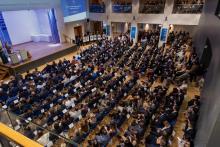553 graduates and 79 doctoral and post-doctoral graduates are saying goodbye to TU Bergakademie Freiberg this year. More than 200 of them will celebrate their academic degrees on 8 November in the Alte Mensa in Freiberg city centre. The most common degrees are in engineering, natural sciences and economics. With their knowledge, graduates and postgraduates are sought-after specialists for global challenges.
A good 60 per cent of graduates now have a Master's degree from Freiberg University in their pockets; 24 per cent completed their studies with a Bachelor's degree and 16 per cent with a diploma. For the first time this year, students were awarded a degree in the international Master's programme Mathematics for Data and Resource Sciences. The degree programme was introduced in 2022.
79 graduates with a doctorate or habilitation
Of the 79 doctoral and habilitation graduates, around 30 percent are female. 35 researchers came to Freiberg from abroad to obtain their doctorate. All of the graduates received their degrees between 1 October 2024 and 30 September 2025.
A special honour was bestowed on 20 people who completed their doctorates summa cum laude (with distinction). Nine other people were honoured with prizes at the event.
Georgius Agricola Medal for commited students
The best graduates from the six Freiberg faculties are traditionally awarded the Georgius Agricola Medal by the Association of Friends and Sponsors of TU Bergakademie Freiberg. The prize, named after the father of mineralogy, is awarded annually for outstanding academic achievements and honourable commitment and is endowed with 500 euros. This year, students Katharina Klose and Arefeh Mansouri as well as students Yannik Höll, Alexander Kaufmann, Fabian Kaulfuß and Aagashram Neelakandan received the prizes.
Julius Weisbach Prizes for good teaching
Annika Böhle and Hripsime Gevorgyan received the Julius Weisbach Prize for outstanding teaching at the ceremony. The teaching prize is also donated by the Association of Friends and Sponsors of TU Bergakademie Freiberg and is awarded on the recommendation of the students. Annika Böhle teaches at the Institute of Physical Chemistry and shows particular commitment to the individual learning progress of all course participants by focussing on the level of knowledge of each student. Hripsime Gevorgyan teaches courses in the field of mineralogy. Among other things, the lecturer facilitates excursions or conference participation for the students and offers special preparation with individual coaching to prepare for international conferences or tips for scientific posters.

